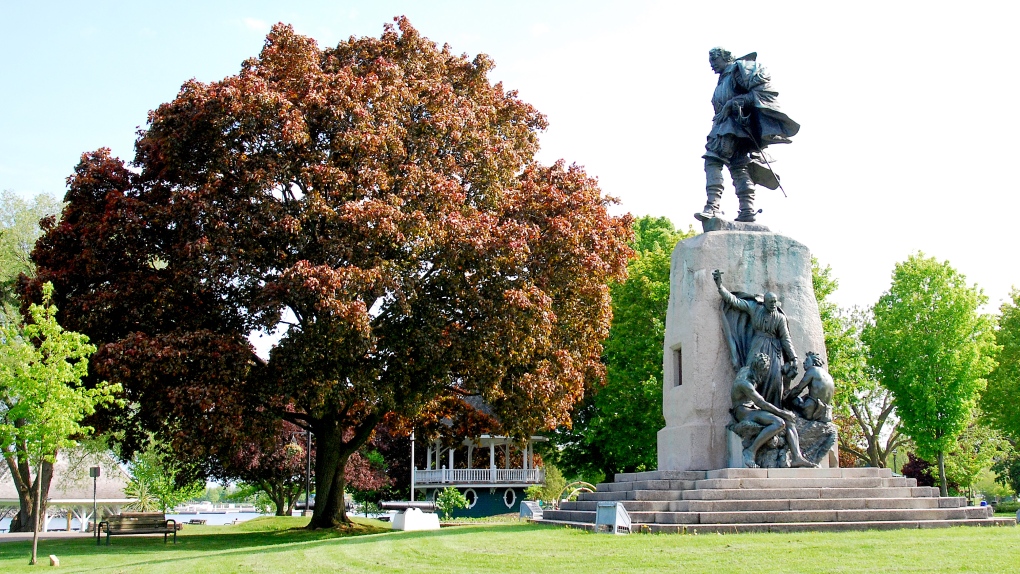Orillia seeks ownership of federal land where controversial monument once stood
Nearly a decade after a controversial monument of Samuel de Champlain was removed in Couchiching Beach Park in Orillia, the City wants to regain ownership of the land where it once stood.
On Monday, city council passed a motion that would see the City ask Parks Canada to transfer the land back to Orillia.
"I think it's time," said Mayor Don McIsaac. "We just finished the boat ramp, and we finished the revitalization of our beautiful waterfront. So now, the next step is Terry Fox Circle. We're working on plans to resurface it, and the plinth is within the area, so we just thought it was time to do that."
- Download the CTV News app to get local alerts on your device
- Get the latest local updates sent to your email inbox
A monument of Samuel de Champlain has stood at the heart of Couchiching Beach Park since 1925, and ownership of the monument and its land was ceded to the federal government in 1955.
It was removed for refurbishment in 2017 but was already considered to be racist by critics at the time for its portrayal of Indigenous people. The original monument portrays Samuel de Champlain at the top of the podium, with four Indigenous figures at his feet.

After several attempts by a working group comprised of Parks Canada, the City, Chippewas of the Rama First Nation and Huron-Wendat First Nation to return an altered version of the statue, the decision was eventually deferred and shelved indefinitely.
Now, all that remains of the monument is the base.
"The first step is to get the land back, and then we need to figure out what to do with the next step, which is what to do with the monument," the mayor said. "There's a faction that says to bring it back exactly, there's another that says 'no no, we don't ever want to see it again.' Not everybody is going to like it, but we need to be conscious of what the community is asking for and what the community's voice is."
Reopening that conversation is painful for some opposed to the monument's return.
Amanda Dale is the director of Bear Waters Gathering, an Indigenous Educational Centre in the Heart of Muskoka.
"When they say this is a differing of opinions, it's heartbreaking," Dale told CTV News. "It's not a difference of opinion; there's fact, and then there's opinion, and Indigenous people talked about the fact of the statue, the fact of history, the fact of the harm of the ideologies were perceived in this statue."
Dale added that the monument misrepresented history and perpetuated a narrative of colonialism.
"At the same time, it's laughable because it's ridiculous that we're still in the same spot that we were a decade ago," Dale said.
CTV News reached out to the Rama First Nation for comment but was declined.
McIsaac, recognizing the monument's strong emotion, said that the City wants to hear from as many stakeholders as possible.
"I'm taking input from everybody, but this is Orillia's monument. This really is Orillia's issue to deal with, but we'll take input from all stakeholders."
Parks Canada said it had yet to receive a formal request from the City, which was confirmed by the mayor as its request has not yet gone out.
CTVNews.ca Top Stories

W5 Investigates A 'ticking time bomb': Inside Syria's toughest prison holding accused high-ranking ISIS members
In the last of a three-part investigation, W5's Avery Haines was given rare access to a Syrian prison, where thousands of accused high-ranking ISIS members are being held.
'Mayday!': New details emerge after Boeing plane makes emergency landing at Mirabel airport
New details suggest that there were communication issues between the pilots of a charter flight and the control tower at Montreal's Mirabel airport when a Boeing 737 made an emergency landing on Wednesday.
Class-action lawsuit on 'opioid-related wrongs': Court to rule on drug companies' appeal
Canada's top court will rule Friday on the appeal of a class-action lawsuit meant to recoup some of the costs associated with British Columbia's opioid crisis from major drug makers and distributors.
Real GDP per capita declines for 6th consecutive quarter, household savings rise
Statistics Canada says the economy grew at an annualized pace of one per cent during the third quarter, in line with economists' expectations.
Cucumbers sold in Ontario, other provinces recalled over possible salmonella contamination
A U.S. company is recalling cucumbers sold in Ontario and other Canadian provinces due to possible salmonella contamination.
Irregular sleep patterns may raise risk of heart attack and stroke, study suggests
Sleeping and waking up at different times is associated with an increased risk of heart attack and stroke, even for people who get the recommended amount of sleep, according to new research.
Nick Cannon says he's seeking help for narcissistic personality disorder
Nick Cannon has spoken out about his recent diagnosis of narcissistic personality disorder, saying 'I need help.'
California man who went missing for 25 years found after sister sees his picture in the news
It’s a Thanksgiving miracle for one California family after a man who went missing in 1999 was found 25 years later when his sister saw a photo of him in an online article, authorities said.
As Australia bans social media for children, Quebec is paying close attention
As Australia moves to ban social media for children under 16, Quebec is debating whether to follow suit.

































